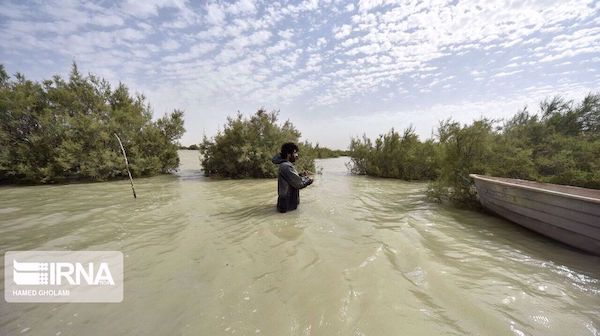
Water released from Kamal Khan Dam in Afghanistan is set to reach Hamun Lake in eastern Iranian region of Sistan where locals have complained about declining share of water coming from Helmand River in neighboring Afghanistan.
A local official in southeast Iran has denied claims made by the Taliban in Afghanistan suggesting that the group had released water from a major dam to feed farms located south of the country as he insists the water will reach the Iranian territory within the next few days.
Hossein Modarres Khiabani, how serves as the governor of Sistan and Baluchestan province, said on Wednesday that Talibanís decision a day earlier to release water from Kamal Khan Dam in Afghanistan was definitely aimed at the Iranian territory.
"With recent precipitation and through follow-ups made by various departments (in Iran), including the presidential envoy to Afghanistan, the Energy Ministry and the Foreign Ministry and even local (Afghan) officials, two gates of Kamal Khan Dam have been opened to release water toward the territory of the Islamic Republic of Iran," said Modarres Khiabani.
He said water was moving toward Iran and it will reach a regional lake in the Sistan region within two to three days.
The announcement came after Talibanís Acting Minister of Energy and Water Abdullatif Mansoor said in a video published online that water had been released on requests by local Afghan farmers in Nimruz province as he denied the decision was meant to give Iran its water right based on a treaty signed nearly five decades ago.
That comes as Iranian presidentís special envoy to Afghanistan Hassan Kazemi Ghomi welcomed Talibanís move to release water from Kamal Khan Dam as he suggested the decision had been taken to comply with a recent agreement between the two countries.
"I declare my gratitude to the Taliban authorities for sticking to their promises in releasing water from Kamal Khan Dam," Kazemi Ghomi was quoted as saying by semi-official Fars news agency on Wednesday.
Iran is entitled to over 800 million cubic meters per year of water from Helmad River, which is called Hirmand on the Iranian side of the border, based on a landmark treaty signed between the two countries in 1973.
LINK: https://www.ansarpress.com/english/26270
TAGS:






























 Farkhunda Buried, Ghani Appoints Fact-Finding Team
Farkhunda Buried, Ghani Appoints Fact-Finding Team




